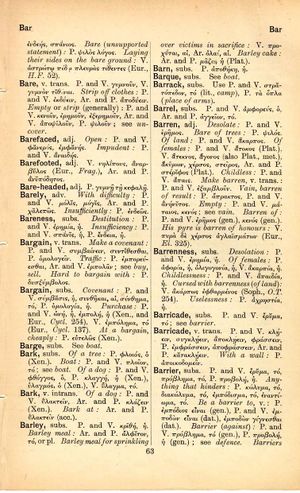barren: Difference between revisions
From LSJ
ἐπεὰν νῶτον ὑὸς δελεάσῃ περὶ ἄγκιστρον, μετιεῖ ἐς μέσον τὸν ποταμόν, ὁ κροκόδειλος ἵεται κατὰ τὴν φωνήν, ἐντυχὼν δὲ τῷ νώτῳ καταπίνει → when he has baited a hog's back onto a hook, he throws it into the middle of the river, ... the crocodile lunges toward the voice of a squealing piglet, and having come upon the hogback, swallows it
m (Woodhouse1 replacement) |
mNo edit summary |
||
| Line 9: | Line 9: | ||
of [[land]]: [[prose|P.]] and [[verse|V.]] [[ἄκαρπος]]. | of [[land]]: [[prose|P.]] and [[verse|V.]] [[ἄκαρπος]]. | ||
of [[female]]s: [[prose|P.]] and [[verse|V.]] [[ἄτοκος]] ([[Plato]]). [[verse|V.]] [[ἄτεκνος]], [[ἄγονος]] (also [[Plato]], Met.), [[ | of [[female]]s: [[prose|P.]] and [[verse|V.]] [[ἄτοκος]] ([[Plato]]). [[verse|V.]] [[ἄτεκνος]], [[ἄγονος]] (also [[Plato]], Met.), [[ἀκύμων]], [[χέρσος]], [[στεῖρος]], [[Aristophanes|Ar.]] and [[prose|P.]] [[στέριφος]] ([[Plato]]). | ||
[[childless]]: [[prose|P.]] and [[verse|V.]] [[ἄπαις]]. | [[childless]]: [[prose|P.]] and [[verse|V.]] [[ἄπαις]]. | ||
Revision as of 13:39, 20 June 2020
English > Greek (Woodhouse)
adjective
of females: P. and V. ἄτοκος (Plato). V. ἄτεκνος, ἄγονος (also Plato, Met.), ἀκύμων, χέρσος, στεῖρος, Ar. and P. στέριφος (Plato).
make barren, verb transitive: P. and V. ἐξαμβλοῦν.
vain, barren of result: P. ἄπρακτος, P. and V. ἀνήνυτος.
empty: P. and V. μάταιος, κενός; see vain.
barren of: P. and V. ἐρῆμος (gen.). κενός (gen.).
his pyre is barren of honours: V. πυρὰ δὲ χέρσος ἀγλαϊσμάτων (Eur., Electra 325).

